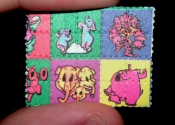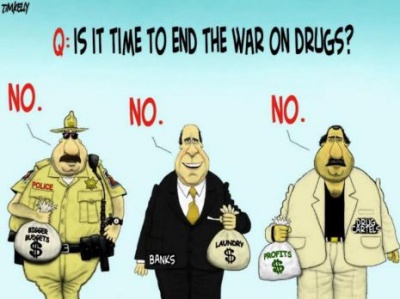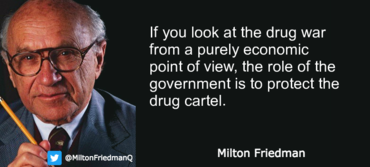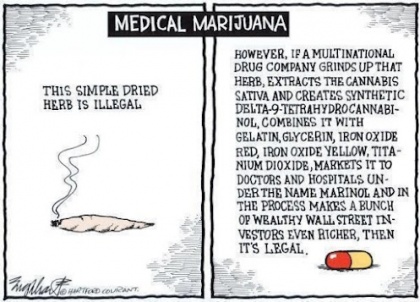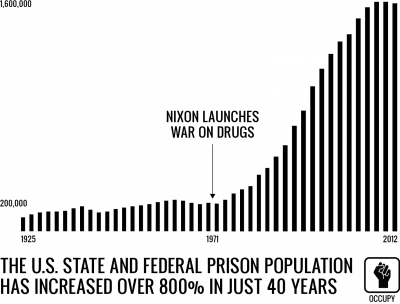Difference between revisions of "War on Drugs"
(image shuffle) |
(moving part of "Perpetual civil war", from "permanent war" here) |
||
| (15 intermediate revisions by 3 users not shown) | |||
| Line 5: | Line 5: | ||
|image_width=333px | |image_width=333px | ||
|so_called=1 | |so_called=1 | ||
| − | |constitutes=Strategy of Tension, perpetual war, fraud | + | |constitutes=Strategy of Tension, perpetual war, fraud, Disaster |
|sourcewatch=http://www.sourcewatch.org/index.php/War_on_Drugs | |sourcewatch=http://www.sourcewatch.org/index.php/War_on_Drugs | ||
| − | }} | + | |historycommons=http://www.historycommons.org/entity.jsp?entity=war_on_drugs_1 |
| − | The '''"War on Drugs"''' is a [[social control]] policy conceived in the [[USA]] in the late [[1960s]] and launched in [[1971]] | + | |description=A [[social control]] strategy that provides a lot of off-the-books funding for the [[US Deep state]] in particular. As a [[strategy of tension]], it has served to scapegoat minorities and is used as a pretext for social [[militarization]] and the removal of [[civil liberties]].}} |
| + | The '''"War on Drugs"''' is a [[social control]] policy conceived in the [[USA]] in the late [[1960s]] and launched in [[1971]] by the government of [[Richard Nixon]]. Nixon's domestic policy chief, [[John Ehrlichman]], later admitted that it was a ploy to undermine opposition to the administration, principally by [[African Americans]] and opposition to the [[Vietnam War]].<ref>http://www.vox.com/2016/3/22/11278760/war-on-drugs-racism-nixon</ref> | ||
| − | In recent decades the ideology has been used to justify fining, [[imprisoning]] or [[killing]] [[drug]] users, producers, dealers or [[drug smugglers]].<ref>http://news.bbc.co.uk/2/hi/middle_east/2966790.stm</ref> Like another [[perpetual war]], the "[[war on terror]]", the crusade against [[drugs]] is [[fear]]- rather than evidence-based. It has been enacted almost worldwide with the help of international groups, most importantly the [[UN]]. It encompasses many recreational [[drugs]], but excludes [[alcohol]] and [[tobacco]]. Its effects include increasing corporate profits, exerting a [[strategy of tension]] like [[stress]] upon the general populace (e.g. by providing material for [[blackmail]]) as well as helping the supranational [[deep state]] to increase its control over the [[illegal drug trade]]. | + | In recent decades the ideology has been used to justify fining, [[imprisoning]] or [[killing]] [[drug]] users, producers, dealers or [[drug smugglers]].<ref>http://news.bbc.co.uk/2/hi/middle_east/2966790.stm</ref> Like another [[perpetual war]], the "[[war on terror]]", the crusade against [[drugs]] is [[fear]]- rather than evidence-based. It has been enacted almost worldwide with the help of international groups, most importantly the [[UN]].{{cn}} It encompasses many recreational [[drugs]], but excludes [[alcohol]] and [[tobacco]]. Its effects include increasing corporate profits, exerting a [[strategy of tension]] like [[stress]] upon the general populace (e.g. by providing material for [[blackmail]]) as well as helping the supranational [[deep state]] to increase its control over the [[illegal drug trade]]. |
==Official narrative== | ==Official narrative== | ||
| Line 25: | Line 26: | ||
===Official opposition narrative=== | ===Official opposition narrative=== | ||
| − | The [[official opposition narrative]] is that it is a huge mistake which doesn't actually succeed in reducing drug consumption, drug-related crime or fatalities. Evidence cited includes the [[Dutch]] or [[ | + | The [[official opposition narrative]] is that it is a huge mistake which doesn't actually succeed in reducing drug consumption, drug-related crime or fatalities. Evidence cited includes the [[Dutch]] or [[Portuguese]] policy of decriminalisation failed to "unleash a drug epidemic", and may in have lead to a ''de''crease in recreational drug usage. In the USA by contrast, illicit drug use has been increasing<ref>https://www.drugabuse.gov/publications/drugfacts/nationwide-trends</ref>:- [[heroin]] use, for example, ''increased'' by 63 percent from 2003 to 2013.<ref>http://www.10tv.com/content/stories/2015/09/06/middletown-ohio-ap-ohio-couple-calls-out-heroin-in-teen-daughters-obituary.html</ref> In 2011, an article in ''[[The Guardian]]'' on the 40th anniversary of the "war on drugs" was critical of the policy, but didn't mention the experience of legalisation, or of John Ehrlichman''s candid admission.<ref name=vox/> It concluded that drug policy should "started from the premise that life in most places is so awful that it leads to catastrophic addiction".<ref name=guard2011/> |
| − | The official opposition narrative doesn't question the putative altruism of the motivation behind the "war on drugs". In fact, more and more people are seeing that the [[deep state]] is playing | + | The official opposition narrative doesn't question the putative altruism of the motivation behind the "war on drugs". In fact, more and more people are seeing that the [[deep state]] is playing both sides - shaping society according to its designs while reaping huge profits from both the [[global drug trade]] and the organised drug law enforcement actions, to say nothing of ancillary businesses such as the [[prison]] industrial complex, [[mass incarceration]] and drug related [[money laundering]].<ref>http://www.unwelcomeguests.net/23</ref> |
====Concerns==== | ====Concerns==== | ||
[[John Ehrlichman]], Nixon's domestic policy chief, admitted in a [[1994]] interview that the "War on Drugs" was a ploy to undermine Nixon's political opposition, candidly stating "Did we know we were lying about the drugs? Of course we did."<ref name=vox>http://www.vox.com/2016/3/22/11278760/war-on-drugs-racism-nixon</ref> | [[John Ehrlichman]], Nixon's domestic policy chief, admitted in a [[1994]] interview that the "War on Drugs" was a ploy to undermine Nixon's political opposition, candidly stating "Did we know we were lying about the drugs? Of course we did."<ref name=vox>http://www.vox.com/2016/3/22/11278760/war-on-drugs-racism-nixon</ref> | ||
| − | Amidst the tired rhetoric about being tough on drug users, many observers have noted that some drugs such as [[cannabis]] have been ''de facto'' legalised in various [[Europe]]an countries without a surge in demand — indeed, often with a ''de''crease in use. This point is not dwelt upon by the {{ccm}}, who continue to suggest that the "war on drugs" is really about reducing harm to people. Moreover, legal drug use in USA has surged during the same time, a trend rarely remarked upon in the context of the "war on drugs".<ref>[http://www.cdc.gov/nchs/data/databriefs/db76.pdf Over 10% US citizens over age 12 were on anti-depressive medicines from 2005-2008 ]</ref> In fact, scientific considerations about the impact of recreational drug use on society as a whole or upon individual users are only of marginal interest to the politicians.<ref>http://www.unwelcomeguests.net/636</ref> | + | Amidst the tired rhetoric about being "tough" on drug users, many observers have noted that some drugs such as [[cannabis]] have been ''de facto'' legalised in various [[Europe]]an countries without a surge in demand — indeed, often with a ''de''crease in use. This point is not dwelt upon by the {{ccm}}, who continue to suggest that the "war on drugs" is really about reducing harm to people. Moreover, legal drug use in USA has surged during the same time, a trend rarely remarked upon in the context of the "war on drugs".<ref>[http://www.cdc.gov/nchs/data/databriefs/db76.pdf Over 10% US citizens over age 12 were on anti-depressive medicines from 2005-2008 ]</ref> In fact, scientific considerations about the impact of recreational drug use on society as a whole or upon individual users are only of marginal interest to the politicians.<ref>http://www.unwelcomeguests.net/636</ref> |
| + | |||
| + | ===Preparations=== | ||
| + | {{FA|War_on_Drugs/Preparation}} | ||
| + | '''Drug epidemics''' are part of '''[[Disaster]] planing''' and preparation. It often involves [[Illegal drug trade]], i.e. when [[LSD]] was introduced and tested by the [[CIA]] in the 1950s or more recently the [[Afghanistan/Reconstruction]] as part of the "[[war on terror]]". | ||
==History== | ==History== | ||
| Line 40: | Line 45: | ||
The [[1937 Marijuana Transfer Tax Act]] was passed after efforts by [[Andrew Mellon]], [[Randolph Hearst]] and the [[Du Pont family]], again with ostensibly altruistic purposes. It was in fact an effort to destroy the fledgling [[hemp]] industry, since hemp was becoming a cheap and superior substitute for the paper pulp that was used to make [[newspapers]]. The act followed a barrage of overtly racist [[propaganda]].<ref>https://www.drugpolicy.org/blog/how-did-marijuana-become-illegal-first-place</ref> | The [[1937 Marijuana Transfer Tax Act]] was passed after efforts by [[Andrew Mellon]], [[Randolph Hearst]] and the [[Du Pont family]], again with ostensibly altruistic purposes. It was in fact an effort to destroy the fledgling [[hemp]] industry, since hemp was becoming a cheap and superior substitute for the paper pulp that was used to make [[newspapers]]. The act followed a barrage of overtly racist [[propaganda]].<ref>https://www.drugpolicy.org/blog/how-did-marijuana-become-illegal-first-place</ref> | ||
| − | The modern "War on Drugs", dated from [[US President]] [[Richard Nixon]]'s 1971 announcement that "drug abuse" was public enemy number one, continues the trend of a deceitful {{on}} serving as cover for deeper purposes. The late [[1960s]] was a period of growing disillusionment amongst US youth with the [[Vietnam War]] in particular and the [[establishment]] in general. This was a key opposition group which Nixon sought to disrupt. In 2011, ''[[The Guardian]]'' claimed that Nixon was "motivated by addiction among US soldiers in Vietnam."<ref name=guard2011>https://www.theguardian.com/society/2011/jul/24/war-on-drugs-40-years</ref> | + | The modern "War on Drugs", dated from [[US President]] [[Richard Nixon]]'s 1971 announcement that "drug abuse" was public enemy number one, continues the trend of a deceitful {{on}} serving as cover for deeper purposes. The late [[1960s]] was a period of growing disillusionment amongst US youth with the [[Vietnam War]] in particular and the [[establishment]] in general. This was a key opposition group which Nixon sought to disrupt. In 2011, ''[[The Guardian]]'' claimed that Nixon was "motivated by addiction among US soldiers in [[Vietnam]]."<ref name=guard2011>https://www.theguardian.com/society/2011/jul/24/war-on-drugs-40-years</ref> |
===Psychedelics=== | ===Psychedelics=== | ||
| Line 78: | Line 83: | ||
===Social engineering=== | ===Social engineering=== | ||
[[Image:WaronDrugs.png|right|400px]] | [[Image:WaronDrugs.png|right|400px]] | ||
| − | Sting operations are carried out in the [[US]] under the "war on drugs" even against children who have mental conditions such as autism. The movie ''[[Reefer Madness]]'' dramatically demonstrates how big media has been used to manipulate populations into accepting laws which infringe on existing [[human rights]] or [[civil liberties]]. As a victimless crime, possession of drugs is an charge which can easily be used to frame or threaten vulnerable people. | + | Sting operations are carried out in the [[US]] under the "war on drugs" even against children who have mental conditions such as [[autism]]. The movie ''[[Reefer Madness]]'' dramatically demonstrates how big media has been used to manipulate populations into accepting laws which infringe on existing [[human rights]] or [[civil liberties]]. As a victimless crime, possession of drugs is an charge which can easily be used to frame or threaten vulnerable people. |
| + | |||
| + | ====Perpetual civil war==== | ||
| + | "The war on drugs" can be viewed as a form of perpetual [[civil war]], a kind of [[strategy of tension]] used to facilitate [[social control]] and/or [[social change]]. The [[ACLU]] observed that "over the last 40 years, we have spent trillions of dollars on the failed and ineffective War on Drugs. Drug use has not declined, while millions of people—disproportionately poor people and people of color—have been caged and then branded with criminal records that pose barriers to employment, housing, and stability."<ref>https://www.aclu.org/issues/smart-justice/sentencing-reform/war-drugs</ref> | ||
==Around the World== | ==Around the World== | ||
Latest revision as of 06:42, 20 December 2021
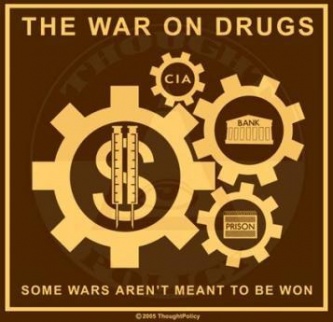 | |
| Date | June 18, 1971 - Present |
| Exposed by | John Ehrlichman |
| Interest of | Daniel Bruno, CIA/Drug trafficking, Bill Conroy, Dark Politricks, Food and Drug Administration, Global Commission on Drug Policy, Michael Levine, Melvyn Levitsky, Tom Lloyd, Narco News, Netherlands/Deep state, Richard Nixon, UN/ODC, UN/Office On Drugs and Crime, Douglas Valentine, Gary Webb, James Q. Wilson |
| Subpage | •War on Drugs/Preparation |
| Description | A social control strategy that provides a lot of off-the-books funding for the US Deep state in particular. As a strategy of tension, it has served to scapegoat minorities and is used as a pretext for social militarization and the removal of civil liberties. |
The "War on Drugs" is a social control policy conceived in the USA in the late 1960s and launched in 1971 by the government of Richard Nixon. Nixon's domestic policy chief, John Ehrlichman, later admitted that it was a ploy to undermine opposition to the administration, principally by African Americans and opposition to the Vietnam War.[1]
In recent decades the ideology has been used to justify fining, imprisoning or killing drug users, producers, dealers or drug smugglers.[2] Like another perpetual war, the "war on terror", the crusade against drugs is fear- rather than evidence-based. It has been enacted almost worldwide with the help of international groups, most importantly the UN.[citation needed] It encompasses many recreational drugs, but excludes alcohol and tobacco. Its effects include increasing corporate profits, exerting a strategy of tension like stress upon the general populace (e.g. by providing material for blackmail) as well as helping the supranational deep state to increase its control over the illegal drug trade.
Contents
Official narrative
The official narrative is that the governments of the world must work together to preserve their citizens' dignity[3] to prevent citizens from using a range ofdrugs which are so dangerous as to overcome the weak-minded and vulnerable.
“A free market for drugs would unleash a drug epidemic, while a regulated one would create a parallel criminal market.”
Antonio Maria Costa [4]
In the USA, the Drug Enforcement Administration (DEA) must ensure that the drug prohibition laws are adhered to, while internationally drug control treaties are need to reduce drug supply. Even relatively harmless drugs such as cannabis must be prohibited since they act as "gateway drugs" to other, more harmful ones.
Official opposition narrative
The official opposition narrative is that it is a huge mistake which doesn't actually succeed in reducing drug consumption, drug-related crime or fatalities. Evidence cited includes the Dutch or Portuguese policy of decriminalisation failed to "unleash a drug epidemic", and may in have lead to a decrease in recreational drug usage. In the USA by contrast, illicit drug use has been increasing[5]:- heroin use, for example, increased by 63 percent from 2003 to 2013.[6] In 2011, an article in The Guardian on the 40th anniversary of the "war on drugs" was critical of the policy, but didn't mention the experience of legalisation, or of John Ehrlichmans candid admission.[7] It concluded that drug policy should "started from the premise that life in most places is so awful that it leads to catastrophic addiction".[8]
The official opposition narrative doesn't question the putative altruism of the motivation behind the "war on drugs". In fact, more and more people are seeing that the deep state is playing both sides - shaping society according to its designs while reaping huge profits from both the global drug trade and the organised drug law enforcement actions, to say nothing of ancillary businesses such as the prison industrial complex, mass incarceration and drug related money laundering.[9]
Concerns
John Ehrlichman, Nixon's domestic policy chief, admitted in a 1994 interview that the "War on Drugs" was a ploy to undermine Nixon's political opposition, candidly stating "Did we know we were lying about the drugs? Of course we did."[7]
Amidst the tired rhetoric about being "tough" on drug users, many observers have noted that some drugs such as cannabis have been de facto legalised in various European countries without a surge in demand — indeed, often with a decrease in use. This point is not dwelt upon by the commercially-controlled media, who continue to suggest that the "war on drugs" is really about reducing harm to people. Moreover, legal drug use in USA has surged during the same time, a trend rarely remarked upon in the context of the "war on drugs".[10] In fact, scientific considerations about the impact of recreational drug use on society as a whole or upon individual users are only of marginal interest to the politicians.[11]
Preparations
- Full article:
 War_on_Drugs/Preparation
War_on_Drugs/Preparation
- Full article:
Drug epidemics are part of Disaster planing and preparation. It often involves Illegal drug trade, i.e. when LSD was introduced and tested by the CIA in the 1950s or more recently the Afghanistan/Reconstruction as part of the "war on terror".
History
Historically, cultures have long sought to control use of certain drugs.[12] In the 19th century, the UK fought the Opium Wars against China to promote opium use by the Chinese. Local laws about drug use began in USA in 1860. The first national law to restrict drug use and distribution in USA was the 1914 Harrison Narcotics Tax Act. Harry J. Anslinger was the first Commissioner of the Federal Bureau of Narcotics, from August 12, 1930 to May 1962. Alcohol Prohibition began in 1920, officially about temperance but unofficially a move by Standard Oil to outlaw the use of alternatives to their petroleum monopoly.
The 1937 Marijuana Transfer Tax Act was passed after efforts by Andrew Mellon, Randolph Hearst and the Du Pont family, again with ostensibly altruistic purposes. It was in fact an effort to destroy the fledgling hemp industry, since hemp was becoming a cheap and superior substitute for the paper pulp that was used to make newspapers. The act followed a barrage of overtly racist propaganda.[13]
The modern "War on Drugs", dated from US President Richard Nixon's 1971 announcement that "drug abuse" was public enemy number one, continues the trend of a deceitful official narrative serving as cover for deeper purposes. The late 1960s was a period of growing disillusionment amongst US youth with the Vietnam War in particular and the establishment in general. This was a key opposition group which Nixon sought to disrupt. In 2011, The Guardian claimed that Nixon was "motivated by addiction among US soldiers in Vietnam."[8]
Psychedelics
Psychedelic drugs had been heavily researched by the CIA (Project MKULTRA and other such) and found to be unhelpful for military purposes, but potentially effective at weakening social conditioning. The importance of such drugs to the burgeoning peace movement can hardly have been lost on legislators. The 1971 Convention on Psychotropic Substances banned LSD and many other such drugs in USA and other signatory countries.
Purposes
The global drug trade has long been the source of immense profits for those groups which control it. Small scale trade is carried out by individuals and small groups, but nowadays the top levels are tightly dominated by deep state groups, which derive huge off-the-books profits from the practice. Some is fed straight back into black budgets to fund black ops, some is laundered and siphoned off as private profits. The "war on drugs" is essential to protecting these high profit margins.
Global Drug Trade
- Full articles: Global Drug Trade, CIA/Drug trafficking
- Full articles: Global Drug Trade, CIA/Drug trafficking
The "war on drugs" facilitates the use of government resources to eradicate competition to CIA drug dealing.
Profiteering
Banks profit from the consequent demand for money laundering, with some in Florida, for example, charging fees of a percent or two for 'counting' large cash deposits. A frequent comment about the "Global Financial Crisis" is that without drug money, the big banks would go out of business.
Big Pharma
- Full article: Pharmaceutical companies
- Full article: Pharmaceutical companies
Pharmaceutical companies financially support campaigns to prevent legalisation of recreational and pain-killing drugs.[15] In contrast to naturally occurring herbal remedies, many of which have long histories of safe use, they seek to promote the use of chemical analogues. Adjudication of their relative lack of safety is up to the national regulatory bodies such as the FDA, many of which are captured by big pharma. As novel pharmaceuticals they are patentable - and therefore monopolizable, if naturally growing opposition can be eliminated through legal measures such as the "war on drugs".
Law Enforcement
Law enforcement and a privatised prison system provide further commercial incentives to keep drugs illegal. Former LAPD Deputy Chief Stephen Downing explains that the practice of sending undercover police into schools to buy drugs "is not about public safety – the public is no safer, and the school grounds are no safer. The more arrests you have, the more funding you can get through federal grants and overtime."[16]
Private Prisons
- Full article: Prison
- Full article: Prison
About half of the US prison population are locked up for drug offences; as a major part of the school-to-prison pipeline, the "war on drugs" is a major factor in the profitability of the private prisons.[16] Mandatory minimum sentences have seen non-violent drug dealers convicted for as long as 55 years without the possibility of parole.[17][18]
Social engineering
Sting operations are carried out in the US under the "war on drugs" even against children who have mental conditions such as autism. The movie Reefer Madness dramatically demonstrates how big media has been used to manipulate populations into accepting laws which infringe on existing human rights or civil liberties. As a victimless crime, possession of drugs is an charge which can easily be used to frame or threaten vulnerable people.
Perpetual civil war
"The war on drugs" can be viewed as a form of perpetual civil war, a kind of strategy of tension used to facilitate social control and/or social change. The ACLU observed that "over the last 40 years, we have spent trillions of dollars on the failed and ineffective War on Drugs. Drug use has not declined, while millions of people—disproportionately poor people and people of color—have been caged and then branded with criminal records that pose barriers to employment, housing, and stability."[19]
Around the World
The "War on Drugs" is regularly exploited a cover for US/Foreign Policy. The major drug producing regions of the world are of particular interest to the deep state.
Colombia
- Full article:
 Plan Colombia
Plan Colombia
- Full article:
Colombia is used as a US beachhead in South America. Peter Dale Scott correctly predicted when Plan Colombia was announced that increased military planes flying to and from Colombia would correlate with increased cocaine arriving in the USA. Peru was turned into a "narco-state" for a time under the kleptocracy of Alberto Fujimori, managed by deep state spook Vladimiro Montesinos.
Afghanistan
In 2014 the Special Inspector General for Afghanistan Reconstruction (SIGAR) John F. Sopko admitted that "Despite spending over $7 billion to combat opium poppy cultivation and to develop the Afghan government’s counternarcotics capacity, opium poppy cultivation levels in Afghanistan hit an all-time high in 2013."[20] Sibel Edmonds explains that profits from opium production and export has been massively streamlined and stepped up during the US occupation of Afghanistan, and that Russia has been more or less cut out of the trade, leaving Turkey as the major shipping point.[21]
Other countries
In the Philippines, Rodrigo Duterte claimed that drugs presented a threat to national security, and that this justified the extra judicial killing of thousands of people, arguably including journalists intent on reporting on his conduct.[22][23]
Examples
| Page name | Description |
|---|---|
| Document:Hong Kong and the Sassoon Opium Wars | |
| Plan Colombia | This was officially intended to decrease cocaine production and export to the US. On its announcement, Peter Dale Scott predicted that increased involvement of the US military would have an entirely converse effect. His prediction, that the amount of cocaine produced and exported would increase, proved correct. |
| Prohibition | The banning of drinkable alcohol (ethanol). This served multiple hypocritical purposes, much like the later "war on drugs". High on the list, as usual, were the private interests of the small clique who arranged it. |
| United States opioid epidemic | The extensive overuse of prescription opioid medications leading to illegal use in the United States from the 1990s. The purpose was to create a market for Afghan opium and to break potential political dissent. |
Related Quotations
| Page | Quote | Author | Date |
|---|---|---|---|
| Blowback | “You want to know what this was really all about. The Nixon campaign in 1968, and the Nixon White House after that, had two enemies: the antiwar left and black people. You understand what I’m saying. We knew we couldn’t make it illegal to be either against the war or black, but by getting the public to associate the hippies with marijuana and blacks with heroin, and then criminalizing both heavily, we could disrupt those communities. We could arrest their leaders, raid their homes, break up their meetings, and vilify them night after night on the evening news. Did we know we were lying about the drugs? Of course we did.” | John Ehrlichman | 1994 |
| Rodrigo Duterte | “If they are there in your neighbourhood, feel free to call us, the police or do it yourself if you have the gun. You have my support. If he fights and fights to the death, you can kill him. I will give you a medal... If you are involved in drugs, I will kill you. You son of a whore, I will really kill you.” | Rodrigo Duterte Wikiquote | 2016 |
| John Ehrlichman | “You want to know what this was really all about. The Nixon campaign in 1968, and the Nixon White House after that, had two enemies: the antiwar left and black people. You understand what I’m saying. We knew we couldn’t make it illegal to be either against the war or black, but by getting the public to associate the hippies with marijuana and blacks with heroin, and then criminalizing both heavily, we could disrupt those communities. We could arrest their leaders, raid their homes, break up their meetings, and vilify them night after night on the evening news. Did we know we were lying about the drugs? Of course we did.” | John Ehrlichman | 1994 |
| Enrique Gomez-Hurtado | “Forget about drug deaths and acquisitive crime, about addiction and AIDS. All this pales into insignificance before the prospect facing the liberal societies of the West, like a rabbit in the headlights of an oncoming car. The income of the drug barons is an annual five hundred thousand million dollars, greater than the American defence budget. With this financial muscle they can suborn all the institutions of the state and, if the state resists, with this fortune they can purchase the firepower to outgun it. We are threatened with a return to the Dark Ages of rule by the gang. If the west relishes the yoke of the tyrant and the bully, current drug policies promote that end.” | Enrique Gomez-Hurtado | February 2001 |
| Heroin | “To understand this war and to understand the problems of heroin in particular, you need to grasp one core fact. In the words of Professor Arnold Trebach, the veteran specialist in the study of illicit drugs: "Virtually every 'fact' testified to under oath by the medical and criminological experts in 1924... was unsupported by any sound evidence." Indeed, nearly all of it is now directly and entirely contradicted by plentiful research from all over the world. The first casualty of this war was truth and yet, 77 years later, it still goes on, more vigorous than ever.” | February 2001 | |
| Singapore | “Singapore is a representation of humanity’s techno future. The city-state is one of the top Asian cities in terms of wealth, with a highly educated population and impressive infrastructure and public services.
But in the past seven months, Singapore has sent at least 11 people to the gallows. And, that should be a concern for rights groups and Christian Churches that campaign against capital punishment. The figure is met with skepticism, as Singapore does not notify the public about every execution it carries out nor does it release information about inmates waiting for their turn to be executed. Prison officials and executioners are bound by the Official Secrets Act not to divulge details of their work. The death penalty raises many questions as the state decides who lives and dies, and ultimately what message capital punishment conveys to society as a whole.” | UCA News | 2022 |
| Peter R. de Vries | “We already lost the War on drugs long ago, and the policy is bankrupt, it has led to nothing, yes, full prisons, a clogged justice system and it didn't help one bit because you can find a coffee-shop on every corner of the street and even with record-braking catches of shipments of cocaine in the harbour, it doesn't mean anything. We're dealing with a extreme high demand in the world with $300.000.000.000 profit for drug traffickers with $100.000.000.000 of it cocaine alone, with the same 100.000.000.000 for the worldwide diverse police and justice agencies used, amounting to nothing. You can't just maintain this repressive policy. You need to make this more of national health crisis.” | Peter R. de Vries | 2020 |
Related Document
| Title | Type | Publication date | Author(s) | Description |
|---|---|---|---|---|
| Document:Transnationalised Repression Parafascism and the US | article | September 1986 | Peter Dale Scott |
Rating
A still slightly random assortment of ways in to the purposes of the fiction of drug interdiction and the reality of the multi-trillion dollar business which this charade evolved to protect.
References
- ↑ http://www.vox.com/2016/3/22/11278760/war-on-drugs-racism-nixon
- ↑ http://news.bbc.co.uk/2/hi/middle_east/2966790.stm
- ↑ See a 1972 UN resolution[Which?]
- ↑ http://news.bbc.co.uk/2/hi/uk/4787088.stm United Nations Office on Drugs and Crime
- ↑ https://www.drugabuse.gov/publications/drugfacts/nationwide-trends
- ↑ http://www.10tv.com/content/stories/2015/09/06/middletown-ohio-ap-ohio-couple-calls-out-heroin-in-teen-daughters-obituary.html
- ↑ a b http://www.vox.com/2016/3/22/11278760/war-on-drugs-racism-nixon
- ↑ a b https://www.theguardian.com/society/2011/jul/24/war-on-drugs-40-years
- ↑ http://www.unwelcomeguests.net/23
- ↑ Over 10% US citizens over age 12 were on anti-depressive medicines from 2005-2008
- ↑ http://www.unwelcomeguests.net/636
- ↑ http://www.druglibrary.org/schaffer/heroin/opiwar1.htm
- ↑ https://www.drugpolicy.org/blog/how-did-marijuana-become-illegal-first-place
- ↑ https://www.goodreads.com/quotes/18583-see-if-you-look-at-the-drug-war-from-a
- ↑ https://www.usnews.com/news/articles/2016-09-08/fentanyl-maker-donates-big-to-campaign-opposing-pot-legalization
- ↑ a b http://www.rollingstone.com/culture/news/the-entrapment-of-jesse-snodgrass-20140226
- ↑ http://www.progressive.org/mag_abramsky0606
- ↑ http://www.deseretnews.com/article/705300412/Judge-wont-toss-out-55-year-sentence.html
- ↑ https://www.aclu.org/issues/smart-justice/sentencing-reform/war-drugs
- ↑ http://www.commondreams.org/news/2014/10/21/7-billion-us-eradication-effort-delivers-record-high-poppy-crop-afghanistan
- ↑ http://www.unwelcomeguests.net/691
- ↑ http://countervortex.org/taxonomy/term/12
- ↑ http://bigstory.ap.org/article/48c8c2ea89204598ac502c9e35235d73/duterte-says-trump-wished-his-drug-crackdown-success
